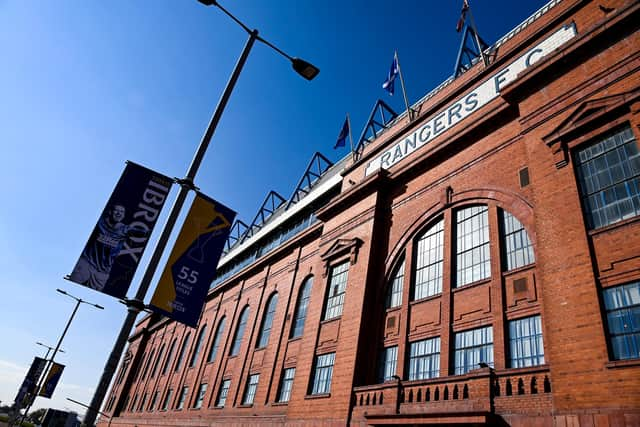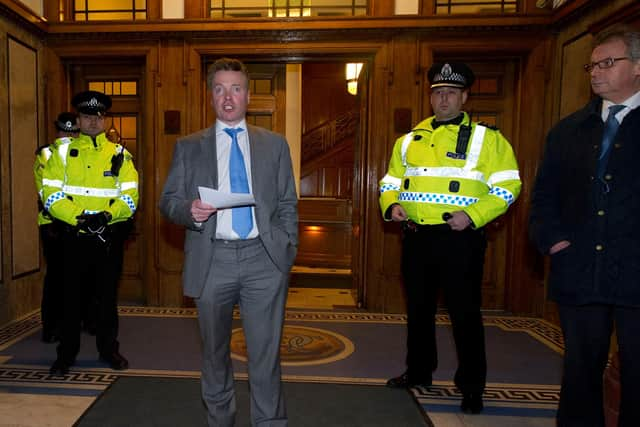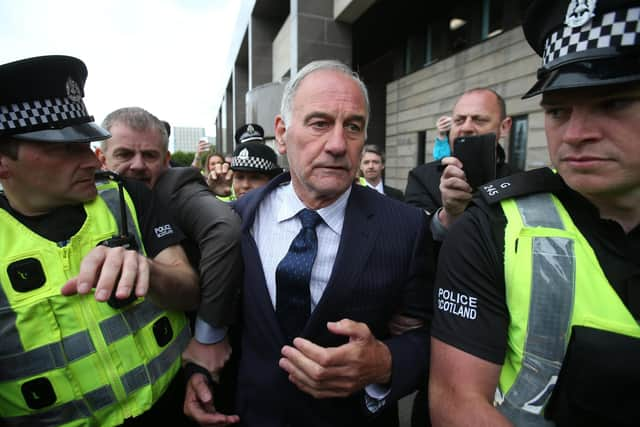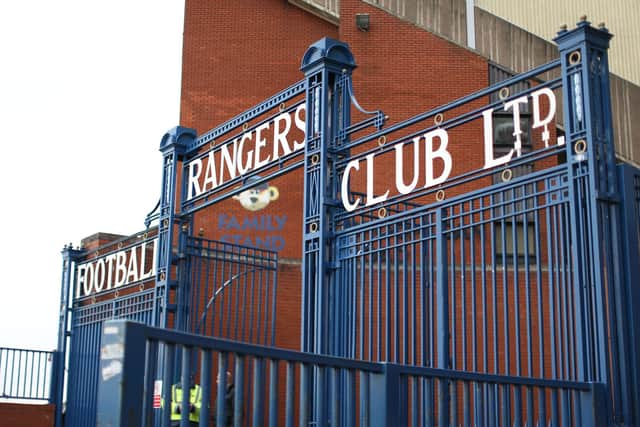Ten years on: Rangers in administration - a look back at the darkest day in the club’s history and the impact on Scottish football
and live on Freeview channel 276
Monday, February 13, 2012 - a date Rangers fans will never look back on with much fondness.
Today marks ten years since the club entered administration, a chain of events which would change Rangers Football Club forever and forced one of Scottish football’s biggest institutions to re-build from the bottom tier.
Advertisement
Hide AdAdvertisement
Hide AdSo what exactly happened and how did the Ibrox club recover? Here, GlasgowWorld takes a look back on the events of that fateful day and the knock-off effect it had on Scottish football.


Background
Rangers regularly posted financial losses during the 1990s and 2000s, a period when financial crises and mis-management were prevalent in world football. The club owed between £25 million and £30 million to Lloyds Banking Group, who had acquired their account from Bank of Scotland by 2009.
Rangers then entered a dispute with HMRC regarding their use of employee benefit trusts, with a tax bill running up to £49million assessed in 2010.
Then-chairman Alastair Johnston admitted in 2011 that the club could go out of business and the scale of potential liability was a major reason why the club struggled to find a suitable buyer when it was put up for sale.
Advertisement
Hide AdAdvertisement
Hide AdOn May 6, 2011, David Murray negotiated the sale of his controlling interest in the club (85.3 percent) to Wavetower Limited, a company owned by Craig Whyte for the nominal value of £1.
This was subject to him repaying the club’s existing £18million overdraft, plus a further £5million per year over the course of four years for new players and stadium improvements.


To pay off the debt to Lloyds, Whyte borrowed £26.7million against future season ticket sales but failed to disclose that he had previously been banned as a company director for seven years.
He began defamation proceedings against BBC Scotland regarding two documentaries about him and his purchase of Rangers.
Advertisement
Hide AdAdvertisement
Hide AdHowever, an investigation by the Scottish Football Association (SFA) found Whyte was not capable of running a football club due to his business failings.
After the club entered administration, the administrators stated that there was no evidence of investment from Whyte into the club.
Murray later confirmed he deeply regretted selling the club to Whyte and would not have done so had he been given more information about him.
Administration and liquidation
On February 13, 2012, Rangers officially filed legal papers at the Court of Session as players and staff were informed of the club’s intention to enter administration.


Advertisement
Hide AdAdvertisement
Hide AdPaul Clark and David Whitehouse of Manchester-based firm Duff & Phelps took over as administrators the following day and began the process of trying to stop the club’s significant financial troubles.
In June, HMRC stated it would vote against a proposed Company Voluntary Arrangement (CVA), meaning that Rangers would be liquidated, while the club would have to be reformed within a new company structure.
With another massive tax bill hanging over the club, administrators determined that Rangers owed at least £55million to various creditors, as well as £79million in unpaid tax.
Duff & Phelps announced in October 2012 that creditors had approved an end to their administration and that they had applied to the Court of Session for BDO to be appointed as liquidator.
New company
Advertisement
Hide AdAdvertisement
Hide AdFollowing the rejection of the CVA, the business and assets of Rangers were sold to Sevco Scotland Ltd, a company owned by a consortium led by Charles Green.


Duff & Phelps then announced extensive wage cuts with then-manager Ally McCoist and several players that has “directly prevented substantial job losses among non-playing staff both at Ibrox and Murray Park.”
However, TEN first-team players including captain Steven Davis, Allan McGregor and Steven Naismith refused to transfer their contracts from the previous regime and left the club.
Duff & Phelps rejected a last minute £6million offer for the assets by another consortium led by the late Walter Smith and included current chairman Douglas Park, due to a binding agreement with Charles Green.
Advertisement
Hide AdAdvertisement
Hide AdFormer player John Brown, who had been serving as a transfer scout for Rangers at the time, had been involved in failed bids and made a further attempt to take control by leading a supporter buyout of Green’s consortium.
That led Green to tell over 5,000 demonstrating supporters outside Ibrox Stadium NOT to renew their season tickets, to “starve” them of funds and force them out.


By July 2012, Rangers were reportedly facing serious financial difficulties of its own as only 250 season tickets had been sold Metro Bank was hired to provide the club with the corporate facilities it required.
In September 2015 Dave King, the chairman of the new Rangers company, suggested that the old company could be taken out of liquidation and re-used as the Rangers trading company.
Advertisement
Hide AdAdvertisement
Hide AdIn February 2017, BDO launched a legal action against Duff & Phelps, claiming damages of up to £28.9 million. Those hearings began last year and BDO were awarded £3.4million.
Response of Scottish football authorities
The financial collapse of Rangers changed the landscape of Scottish football. The Scottish Premier League immediately deducted 10 points to leave them 14 points behind rivals Celtic and effectively end their title hopes.
In April 2012, the SFA fined Craig Whyte £200,00 and banned him from Scottish football for life for bringing the game into disrepute, while Rangers were also hit with a £160,000 fine and had a 12-month player registration embargo placed on them.
Initially it was proposed that the club should be allowed to continue to play in the SPL, despite the failure of the CVA.


Advertisement
Hide AdAdvertisement
Hide AdThat meant Rangers’ membership share in the top-flight had to be transferred to the new company, along with its other assets. However, that transaction needed the approval of a two-thirds majority of the 12 SPL clubs.
The subsequent vote was rejected by a 10–1 majority but SFL and SFA executives proposed a direct entry to the SLFL First Division. Again, though, various clubs voiced their disproval and the SFL voted to let the club join as an associate member and placed Rangers in the Third Division.
An agreement was reached on the transfer of SFA membership, while Sevco Scotland Ltd agreed to accept all conditions relating to charges against Rangers.
The club were NOT stripped of any of their title as an independent commission ruled they “did not gain any unfair competitive advantage”.
Aftermath
Advertisement
Hide AdAdvertisement
Hide AdRangers Football Club post-2012 was described by some in the mainstream media as a “new club” but Charles Green insists that was not the case, while SPL chief executive Neil Doncaster stated “it is an existing club, even though it’s a new company”.
In January 2015, a Celtic fan group paid for a full-page newspaper advertisement to announce that their 120-year Old Firm rivalry had ended and that they would soon play their first fixture against the “new club”.
A number of complaints made to the Advertising Standards Authority after Rangers produced several marketing materials which stated they were “Scotland’s most successful club” but these were not upheld.
Rangers failure to submit accounts for 2011 ensured they were not granted a UEFA licence to play in European football the following season and as a new entity they had to re-apply for membership.


Advertisement
Hide AdAdvertisement
Hide AdCraig Whyte was eventually declared bankrupt in October 2015 and acquitted by a jury of taking over Rangers by fraud following a lengthy seven-week trial at the High Court in Glasgow two years later.
On the field, it took the re-launched Rangers four years to climb up through the divisions and take their place in the Scottish Premiership for the 2016/17 season.
Having lost the 2016 Scottish Cup Final to Hibernian at Hampden Park, Rangers finished third in their first season back in the top tier behind Celtic and Aberdeen as they qualified for European football after a five-year absence.
Comment Guidelines
National World encourages reader discussion on our stories. User feedback, insights and back-and-forth exchanges add a rich layer of context to reporting. Please review our Community Guidelines before commenting.
